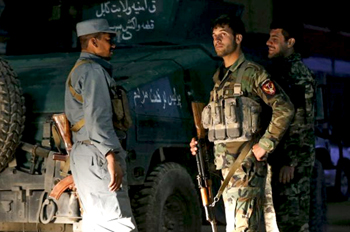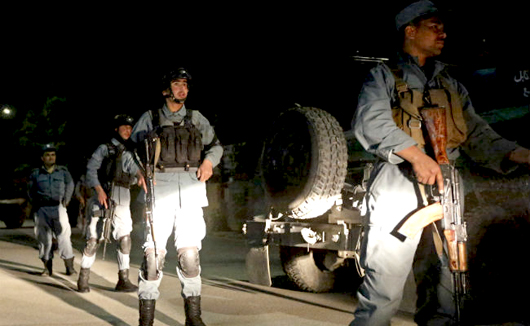Kabul, May 14: The Taliban on Thursday claimed responsibility for an attack during a concert at a Kabul guesthouse that left 14 people dead including four Indians and an American.

"It was a suicide mission carried out by one of our mujaheddin from Logar. The attack was planned carefully to target the party in which important people and Americans were attending," the militants said in a statement.
Security sources in Delhi told Hindustan Times the attack was aimed at the Indian ambassador to Afghanistan. In Afghanistan, President Ashraf Ghani's envoy Ahmad Zia Massoud told local media that the terrorists attacked the guesthouse thinking the Indian ambassador, Amar Sinha, was in the compound.
Sinha was scheduled to visit the guesthouse for a Hindustani classical concert by Ustaad Altaf Hussain. Hussain was present in the guesthouse during the attack and is safe according to the Indian embassy in Kabul.

At least one gunman attacked the guesthouse popular with foreigners in a bold assault that showed Afghanistan still faces security challenges.
Authorities cordoned off the area around the Park Palace guest house in Kabul's Kolola Pushta, a diplomatic enclave in the Afghan capital that includes a number of guesthouses used by foreigners, immediately after the attack began at about 8:30pm local time (1600 GMT).
A standoff with police ended about five hours later as ambulances raced out of the area.
Similar brazen assaults in the past have been carried out by the Taliban and the al Qaeda-linked Haqqani network.
The brutal assault was reminiscent of two attacks by Taliban fighters in Kabul last year, one on a restaurant and another on a hotel.
A spokeswoman for the US Embassy confirmed that one American was killed in the attack.
Three who had lived at the guesthouse were rescued and sheltering at the Indian Embassy, a diplomat said.
"Unfortunately a few Indian casualties among others at the Kabul g/house attack today," Indian Ambassador Amar Sinha tweeted but official sources later told the Press Trust of India that four Indians were among the dead.
Rahimi said at least 44 people who had been trapped inside the guesthouse - some there for a concert, others who had been having dinner - were rescued by police and special forces.
He also said he could verify that there had been just one attacker, although initial reports from police indicated several gunmen were involved.
"The attack did not start with an explosion at the main gate or killing of guards - whatever it was it started from inside the hotel," Rahimi said.
Kolola Pushta, home to several international guest houses and hotels, is near both the Ministry of Interior and the Indian Embassy.
Taliban gunmen killed nine people - including three children - in the upscale Serena Hotel in Kabul last year. Two months earlier, attackers stormed into a popular Lebanese restaurant in the capital and gunned down 21 people, including three United Nations staff and a senior IMF official.
Earlier on Wednesday, gunmen opened fire at a meeting of Muslim clerics in the southern province of Helmand, killing at least seven people, police said.
The Ulemma Council, the highest religious authority in a deeply conservative country, had repeatedly announced its support for security forces fighting the hardline Islamist Taliban insurgents.
The Taliban have stepped up attacks since most foreign forces pulled out at the end of last year.
Ousted from power in 2001, the Taliban have been fighting to bring down the US-backed government in Kabul.






Comments
Add new comment